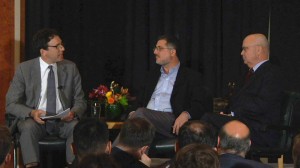 From left: David Schanzer (moderator), Barton Gellman & Michael Hayden.
From left: David Schanzer (moderator), Barton Gellman & Michael Hayden.
Former Director of the National Security Agency Michael Hayden was confronted about his complicity in illegal warrantless surveillance at a recent public event hosted by Duke University. He appeared at the event with Washington Post reporter Barton Gellman to discuss the controversy over leakers and whistleblowers.
Hayden was Director of the NSA following 9/11 during the Bush administration when the decision was made to secretly spy on American citizens without the required warrants – a blatant violation of the FISA surveillance law and the Fourth Amendment to the Constitution. Violations of are punishable by a $10,000 fine and five years imprisonment for each infraction. Hayden and others complicit in the illegal surveillance have never been prosecuted or even investigated for their crimes.
Hayden left the government 2009 for a top position with a national security contractor. He now appears frequently on TV talk shows as an expert on the current NSA controversy, basically defending government surveillance practices.
During the question and answer session following the Duke talk, I asked Hayden how he justified turning the NSA on the American population, a question that is never asked by the friendly media outlets he normally appears on. In his response, he lays out his version of how and why NSA undertook its warrantless surveillance, and why he thinks it is legal and necessary. Barton Gellman fills in some of the history of how it happened.
Hayden is resorting to the same defense that the officials who created and ordered the secret US torture program successfully used to escape any accountability: That he is off the hook because government attorneys told him it was OK. Using the same kind of twisted logic that Justice Department lawyers concocted to protect torturers with the infamous “torture memos,” Hayden argues that what he did is lawful because the President as Commander in Chief has expansive authorities during wartime.
At one point in the discussion Hayden called Edward Snowden a “hunter” who set out from the beginning to find NSA secrets and expose them, not a whistleblower who acted out of concern for wrongdoing that he discovered. Like other pro-NSA officials, Hayden insists that Snowden, instead of going public, should have brought his concerns to appropriate authorities and Congressional intelligence committees. One only has to look at the experience of Thomas Drake and other NSA whistleblowers, to know that going through “official channels” would only result in Snowden being targeted for harassment and prosecution.
Current NSA Director Keith Alexander and Director of National Intelligence James Clapper have been caught lying to Congress, and like Hayden, they are escaping prosecution. The glaring reality is that many of those who are calling for Snowden to be prosecuted and imprisoned are themselves criminals who are walking free.
-David Kasper

